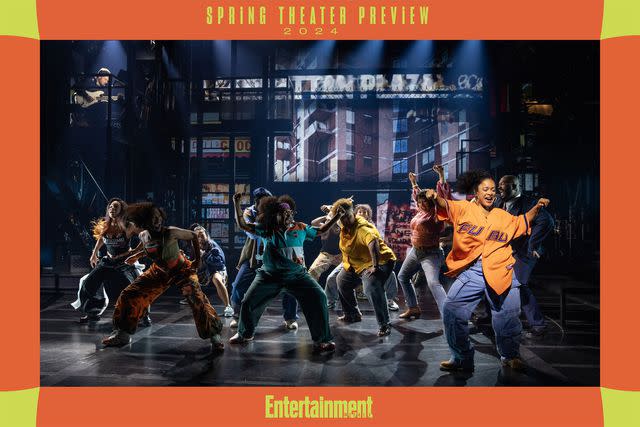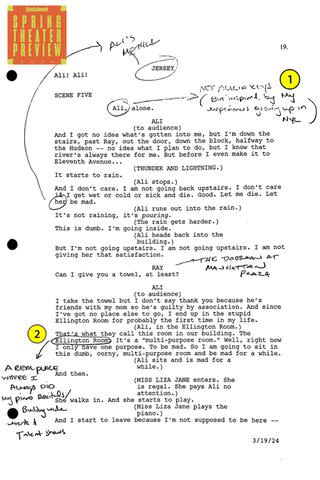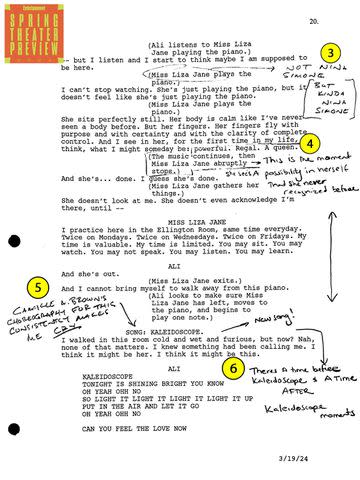Alicia Keys and “Hell's Kitchen” book writer Kristoffer Diaz introduce new song 'Kaleidoscope'

Keys and Diaz take us into the scene that frames Keys' new song, which she wrote for the stage musical.
No one, no one can get in the way of what Alicia Keys is feeling...
Because now Broadway audiences will get to see it brought to life in the new musical Hell's Kitchen, featuring the music of Keys and loosely inspired by Keys' own life growing up in New York City.
Keys, who both reworked some of her pre-existing songs and wrote new tracks for the show, teamed up with writer Kristoffer Diaz to create the musical — and they've been working to bring it to Broadway for over a decade. On April 20 at the Shubert Theatre, that moment will finally arrive.

Joan Marcus
"Hell's Kitchen is a lot about identity," says Keys. "How you find who you are and what you relate to, and how do you undo the thoughts or feelings that are holding you back — other people's guilts or other people's fears that we inherit in our lives."
On Friday, Keys dropped a new song, "Kaleidoscope," which she wrote specifically for the musical. EW caught up with Keys and Diaz to chat about the scene that leads into the musical number, and got all the details about how the entire show works to put us in an empire state of mind.


(1) This is not Alicia Keys
As the note in the script mentions, Ali (Maleah Joi Moon), the main character in Hell's Kitchen is not Alicia Keys — but she is heavily inspired by Keys' own experiences growing up in New York City.
"This is not an autobiography," explains Keys. "But it does have real life experiences that influence and inspire the fictional characters. People do tend to think that this is exactly word for word, every single beat my complete story. It's important to recognize that that's not the case. It's definitely pieces of real life experiences that are inspiring this story, and that's why it feels so genuine, pure, real and honest."
Diaz adds that it was part of his remit from the time he started working with Keys on the script. "She said that we're going to talk about this time in her life — leading up to when she was 17, but it couldn't go into being famous. It actually couldn't even go into performance. It was about this young person coming of age. Once you get that clearance from the person that's telling you the story, then you can open it up to make whatever's going to be the best, most dramatic bit of storytelling."
(2) Welcome to the Ellington Room
The majority of the story takes place in Manhattan Plaza, a federally subsidized apartment complex in midtown Manhattan. And one space in particular, the Ellington Room, where this scene is set, holds immense importance for Keys.
"Manhattan Plaza is such a big character in Hell's Kitchen, and we really did that intentionally from the beginning," says Keys. "It's just such a rich space, man. There's no place like it in the world. You're seeing creative people all over the place. Everyone has this creative essence to them."
"The Ellington Room was a big place that things would happen in the building," she continues. "I had a lot of my first recitals in the Ellington Room where I would be terrified, shaking uncontrollably, and thought I'd never make it through the 10 page classical piece. This room is very central to the community. Those who have grown up in Manhattan Plaza who have come to see the show they're taken by how special the representation of this building and the character of this building is."
(3) Musical inspirations
Keys specifies in her script notes that the character of Miss Liza Jane is heavily influenced by Nina Simone. Both Diaz and Keys wanted to ground each character in the show in a specific musical language and style. "Every character in Hell's Kitchen has a musical inspiration," she says. "That's been very grounding for us and definitely for me as a songwriter, figuring out, 'What's the tone of this person, and how does it vary from the others?'"
"You're hearing jazz; you're hearing soul; you're hearing hip hop; you're hearing R&B; you're hearing pop; you're hearing all of these different styles all in one piece," she continues. "Nina Simone is definitely the musical muse for Miss Liza Jane, but she's also based on one of my first music teachers in high school, who was a big influence in my life. She's also based on a little bit of my grandmother. That's where all the pieces come together."
(4) Hail to the queen
Watching Miss Liza Jane play awakens something in Ali, allowing her to see a previously unconsidered future for herself: "Powerful. Regal. A queen." Keys and Diaz call particular attention to this moment in the script because of how a similar moment in Keys' life fundamentally altered the trajectory of her existence.
"It's so powerful to Alicia," says Diaz. "Sitting in a room watching what Alicia does at a piano, you feel all those things. And Alicia used those words in one of our first meetings when she was talking about Nina Simone."
"This is really the first time that she's seeing herself and she's realizing what she can be," adds Keys of Ali's epiphany. "I remember the specific performance that I saw of Nina Simone. Prior to that moment, I had never seen a Black woman so fiercely play classical music. I remember as a young Black woman seeing myself in her in a way that drove me in a way that I'd never been driven before. I wanted to play piano in a way that'd I never played it before. I wanted to learn what I didn't know. I wanted to try what I never thought I could. I saw something in her that gave me permission to realize, 'Wow, I can do something that I never imagined I could do.'"
(5) Dance it out
In the annotations, Diaz notes "Camille A. Brown's choreography for this consistently makes me cry" in regards to the production number that accompanies new song "Kaleidoscope."
Diaz notes that the song evolved a lot thanks to Brown and her choreography. "The version that Alicia had recorded originally had a real different sound," he notes. "This is such a collaborative project that our directors, our actors, and our choreographer shape so much of what we do. I don't cry a lot, but I've cried more in a rehearsal room for this show than for anything else. Because our team is beautiful, and there's a real great feeling of community that it's built around."
"Camille captured that moment of waking up," he continues. "There's before this moment in your life and there's after this moment in your life, and I get choked up even thinking about it. I won't say more than this, but the moment that the dancers first appear in this piece, it hits me every time."
"Camille is a one of a kind choreographer," adds Keys. "Her work brings so much emotion to it. I like to think of myself as an emotional writer. I love that the songs that I write tug at your heartstrings. But she's going to take every lyric, and she's going to pull something out of it that even I didn't know it was supposed to feel like that."
Diaz also teases Keys, noting that she wore her sunglasses in the rehearsal room the last time they watched this number — to cover her own tears.
(6) Light it up
Hell's Kitchen features a kaleidoscope of some of Keys' most beloved tracks and new numbers, beginning with "Kaleidoscope."
Diaz breaks down the process of how they built the story around Keys' catalog and found spaces where new songs were required. "As soon as you get brought on to work on an Alicia Keys musical that's using existing songs, you know 'Fallen' is in the show, 'No One' is in the show, 'Empire State of Mind' is in the show," he says. "The exciting thing was knowing that there were new songs coming all throughout the process."
Keys has been working on the shop for nearly 13 years, and in that time, she's written plenty of new music, both for the show and her own records. The songs have been revised, moved around, cut altogether, and sometimes, some of her new tracks as an artist ended up in the show. "There's songs in the show that are existing," explains Diaz. "Songs that were not existing songs, existing songs that are out in the world that are cataloged that have been released. Popular songs that didn't exist [when we first started], and then we would grab them and slide them in."
The process was made easier by the fact that Keys' songs are already heavily steeped in storytelling. "Musical theater songs have to be not just great songs, but they have to move story forward," says Diaz. "But Alicia is writing songs that already do that. Not every pop or R&B composer is going to have songs that move dramatically already. Most of these songs did."
"Kaleidoscope" was specifically written for Hell's Kitchen. "It's that feeling when everything is spectacular and there's this moment that becomes illuminated and you just feel like, 'Wow,'" Keys says of the impetus for the song. "'Kaleidoscope' was one of those where we knew that it wanted to feel joyful and fun. It started one way, and as we went on, we realized, 'You know what? We need a whole dance.' So, how are we going to add this increased musicality so that they can be feeling that essence of this kaleidoscopic feeling? Each time it grows and grows and grows."
Related content:
Read the original article on Entertainment Weekly.

 Yahoo News
Yahoo News 
